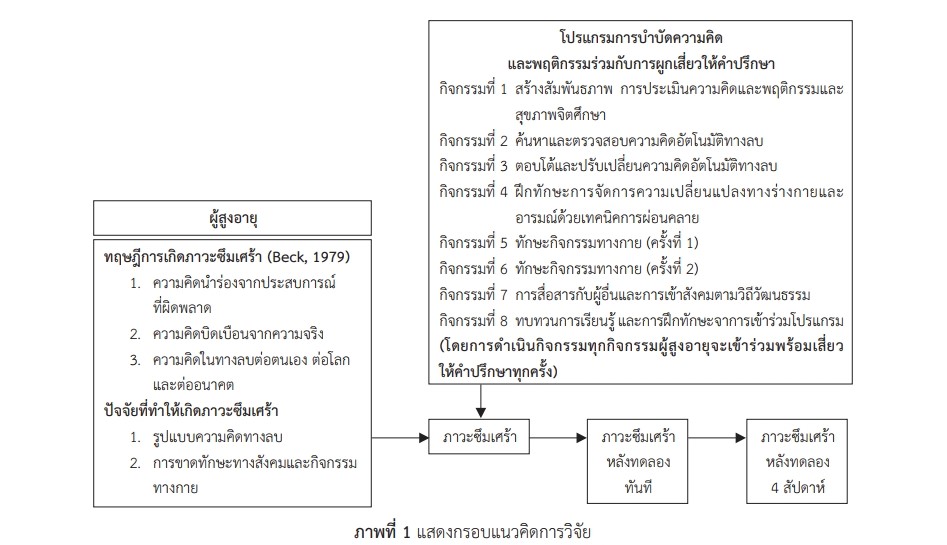ผลของโปรแกรมการบำบัดความคิดและพฤติกรรมร่วมกับการผูกเสี่ยวให้คำปรึกษาต่อภาวะซึมเศร้าของผู้สูงอายุ
คำสำคัญ:
การบำบัดความคิดและพฤติกรรม, การผูกเสี่ยวให้คำปรึกษา, ภาวะซึมเศร้าในผู้สูงอายุ , โปรแกรมการบำบัดแบบกลุ่ม, ผู้สูงอายุในชุมชนในเขตภาคตะวันออกเฉียงเหนือบทคัดย่อ
ภาวะซึมเศร้าส่งผลกระทบทางลบต่อผู้สูงอายุทั้งด้านร่างกาย อารมณ์ ความคิดและพฤติกรรม ผลกระทบของภาวะซึมเศร้าที่ร้ายแรงคือการฆ่าตัวตาย การช่วยเหลือเพื่อลดภาวะซึมเศร้าเป็นสิ่งสำคัญ การวิจัยกึ่งทดลองนี้มีวัตถุประสงค์เพื่อศึกษาผลของโปรแกรมการบำบัดความคิดและพฤติกรรมร่วมกับการผูกเสี่ยวให้คำปรึกษาต่อภาวะซึมเศร้าของผู้สูงอายุ กลุ่มตัวอย่างเป็นผู้สูงอายุในชุมชนเขตภาคตะวันออกเฉียงเหนือ ที่มีภาวะซึมเศร้าระดับ เริ่มมีภาวะซึมเศร้า ควรได้รับคำแนะนำและการดูแลเบื้องต้น 60 ราย ถูกสุ่มอย่างง่ายเข้ากลุ่มทดลองและกลุ่มควบคุม กลุ่มละ 30 ราย กลุ่มทดลองได้รับโปรแกรมการบำบัดความคิดและพฤติกรรมร่วมกับการผูกเสี่ยวให้คำปรึกษาจำนวน 8 สัปดาห์ ส่วนกลุ่มควบคุมได้รับสุขภาพจิตศึกษารายกลุ่ม 1 ครั้ง ร่วมกับการให้การปรึกษารายบุคคลตามคำขอ และการดูแลตามปกติ การประเมินผลโดยใช้แบบวัดภาวะซึมเศร้าในผู้สูงอายุของไทย โดยวัด 3 ครั้ง คือ ก่อนเริ่มโปรแกรม หลังโปรแกรมสิ้นสุดทันที และหลังโปรแกรมสิ้นสุด 4 สัปดาห์ วิเคราะห์ข้อมูลด้วยสถิติการวิเคราะห์ความแปรปรวนแบบวัดซ้ำ
ผลการศึกษาพบว่าคะแนนเฉลี่ยภาวะซึมเศร้าของกลุ่มทดลองหลังการทดลองสิ้นสุดทันทีและหลังการทดลองสิ้นสุด 4 สัปดาห์ ต่ำกว่าก่อนการทดลองอย่างมีนัยสำคัญทางสถิติ (p < .01) และเมื่อเปรียบเทียบคะแนนเฉลี่ยภาวะซึมเศร้าระหว่างกลุ่มทดลองและกลุ่มควบคุมพบว่ากลุ่มทดลองมีคะแนนเฉลี่ยภาวะซึมเศร้า หลังทดลองสิ้นสุดทันทีและหลังการทดลองสิ้นสุด 4 สัปดาห์ ต่ำกว่ากลุ่มควบคุมอย่างมีนัยสำคัญทางสถิติ (p < .01)
จากผลการศึกษานี้มีข้อเสนอแนะว่า พยาบาลสามารถนำการใช้โปรแกรมการบำบัดความคิดและพฤติกรรมร่วมกับการผูกเสี่ยวให้คำปรึกษาไปใช้บำบัดผู้สูงอายุในชุมชนที่มีภาวะซึมเศร้าระดับเริ่มมีภาวะซึมเศร้า ควรได้รับคำแนะนำและการดูแลเบื้องต้น
เอกสารอ้างอิง
Beck, A.T., Rush, A. J., Shaw, B. F., & Emery, G. (1979). Cognitive therapy of depression.New York: Guilford.
Buasri, U. (2019). Phuk Seow ceremony, faculty of humanities and social science center of arts and culture Khon Kaen University, Thailand. Retrieved from http://www.mcukk.com/buddhasilpa/files/siaw.pdf
Bunloet, A. (2016). Prevalence and factors associated with depression among the elderly community residents with chronic diseases in Samliam Urban Primary Care Unit, Khon Kaen. Srinagarind Med J, 31(1), 25-33. [In Thai]
Chantakeeree, C. (2016). Promoting exercise behavior for vulnerable elderly. The Journal of Faculty of Nursing Burapha University, 24(2), 1-13. [In Thai]
Little, R. J. A., & Rubin, D. B. (2002). Statistical analysis with missing data (2nd ed.). New York: John Wiley & Sons
Longchoopol, C., Thapinta, D., Ross, R., & Lertwatthanawilat, W. (2018). The Thai group cognitive behavior therapy intervention program for depressive symptoms among older women: A randomized controlled trial. Pacific Rim International Journal of Nursing Research, 22 (1), 74–85. Retrieved from https://he02.tci-thaijo.org/index.php/PRIJNR/article/view/78778
Longphasuk, N. (2019). Physical Activity in Older Adults: Applying Self-Efficacy Theory. Vajira Nursing Journal, 21(2), 61-76. [In Thai]
Malai, C., Chaiyoyingyong, R., Dangdomyouth, P., & Cheaplamp, S. (2019). Factors related to depressionAmong older adults in community, Ratchaburi province. Songklanagarind Journal of Nursing, 39(3), 67-76. . [In Thai]
National Health Security Office. (2022). Population structure report. Retrieved from https://ubon.nhso.go.th/starter/region/poppyramid.php
Ngamsri, M., Banthoengsuk, H., Jaisawang, D., Somsuvun, C., & Yaowaboot, A. (2021). Prevalence of stress depression and resilience of the elderly during the COVID-19 pandemic. Journal of Srivanalai Vijai, 11(2), 1-16 [In Thai]
Paungrod, N. (2015). The study on depression in Nonthaburi province elderly. Princess of Naradhiwas University Journal of Humanities and Social Sciences,2(1) Retrieved from https://so05.tci-thaijo.org/index.php/pnuhuso/article/view/53509. [In Thai]
Rodcharoen, S. , Kongsuwan, V., & Chanchong, W. (2019). The effects of self-guided cognitive behavioral modification program on self-esteem and depression of elders with major depressive disorder. Nursing Science Journal of Thailand, 37(3), 91-106. [In Thai]
Ruangtrakul, S. (2014). Textbook of psychiatry (10th ed.). Bangkok: Faculty of Medicine Siriraj Hospital Mahidol University.
Samansap, N., & Soonthomchaiya, R. (2012). Selected factors related to hopelessness among elderly patients with major depression. Journal of Psychiatric Nursing and Mental Health, 26(3), 57-70. [In Thai]
Sangsai, W., & Soonthornchaiya, R. (2014). Effect of cognitive behavior therapy on depression and functioning of elderly patients with depression. The Journal of Psychiatric Nursing and Mental Health, 28(3), 104-116. [In Thai]
Suksawat, B., Hengudomsub, P, & Nabkasorn, C. (2017). The effects of group cognitive behavioral modification program on hope and depression among community-dwelling older adults. The Journal of Faculty of Nursing Burapha University, 25(1), 95-107 [In Thai]
Suwattanakoop S, & Kanchanatawan, B. (2014). A comparative study of depression between the elderly living in their own home and those in nursing home for the aged, Mueang district, Chiang Mai. Chula Med J, 58(3), 341 [In Thai]
Ubonwannee, P., Keawkingkeo, S., & Bunthumporn, N. (2017). The effects of a psycho-education program on the depressive symptoms among older adults. Buddhachinaraj Medical Journal, 34(3), 342-349. [In Thai]
Wongpakaran N., & Wongpakaran T. (2012). Prevalence of major depressive disorders and suicide in long-term care facilities: A report from northern Thailand. Psychogeriatrics, 12(1), 11-17. doi: 10.1111/j.1479-8301.2011.00383.x
World Health Organization. (2017). Depression and other common mental disorders: Global health estimates. Retrieved from https://apps.who.int/iris/bitstream/handle/10665/254610/WHO-MSD-MER-2017.2-eng.pdf

ดาวน์โหลด
เผยแพร่แล้ว
รูปแบบการอ้างอิง
ฉบับ
ประเภทบทความ
สัญญาอนุญาต

อนุญาตภายใต้เงื่อนไข Creative Commons Attribution-NonCommercial-NoDerivatives 4.0 International License.




